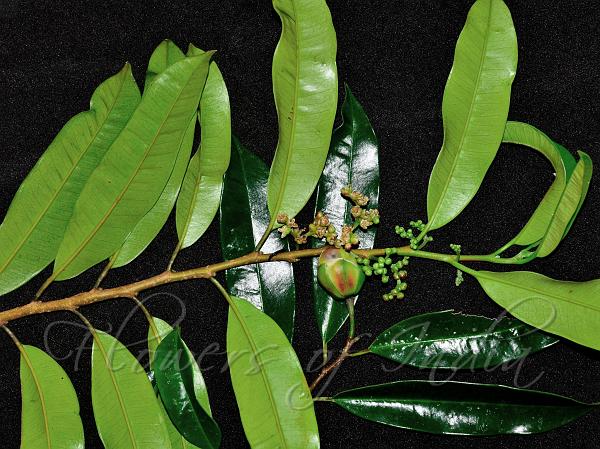|
| East-Indian Streblus |
|

|

| File size | 1360532 |
| Original date | 9/29/17 6:56 PM |
| Resolution | 4928 x 3264 |
| Flash | Flash fired, return detected |
| Focal length | 60.0mm |
| Exposure time | 1/250s |
| Aperture | 10.0 |
| Focus Distance | |
| Metering Mode | Multi-segment |
| Camera make | NIKON CORPORATION |
| Camera model | NIKON D7000 |
| Sensor type | OneChipColorArea |
|
|
|
|
Photo: |
Botanical name: Pseudostreblus indicus Family: Moraceae (Mulberry family)
Synonyms: Streblus indicus
Synonyms: Streblus indicus
East-Indian Streblus is a medium sized tree 10-15 m
tall. Bark is whitish or greenish grey, with scattered warts, inside
dull-white, soon turning greenish black with strong fibrous layers,
spines absent, young branches velvet-hairy. Leaves are alternate,
bifarious, narrow, elliptic, tapering 5-16 x 2.5-5 cm across, leathery,
hairless, dark-green above, paler beneath, margin entire, tip tapering,
lateral veins 10-20 with many intermediate ones on either half,
straight and parallel, ultimately forming several loops of
intramarginal veins, leaf-stalk 0.5-1 cm long, stipules ovate
lanceshaped. Inflorescence with one apical female and many basal male
flowers. Male inflorescence in leaf-axils, bracts 3, triangular. Female
flowers are solitary or mixed with the male, sepals 4, round, concave,
accrescent, ovary spherical, style branched after the base, enclosing
the fruit. Drupes spherical 0.6-0.8 cm across, seeds white. East-Indian
Streblus is found in NE India to S. China and Indo-China, at altitudes
of 600-1400 m. Flowering: October-November.
| Identification credit: M. Sawmliana | Photographed in Darlawn, Mizoram. |
• Is this flower misidentified? If yes,